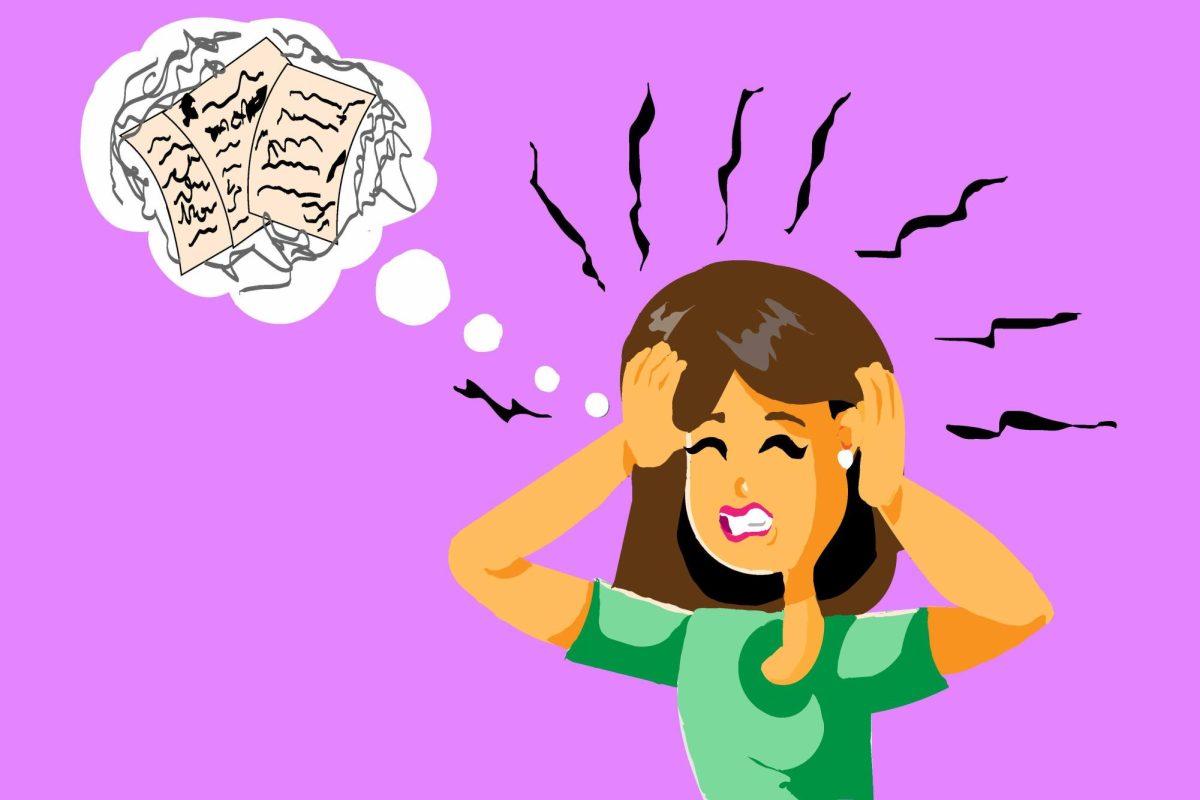As we edge towards finals, the competition to get a table and save a seat for your friends in Bobst Library is heating up, with our academic pursuit taking on a frantic intensity and the Starbucks line remaining endless. Over the years, finals week has transcended from a set of exams to the death knell of free time — a grim foretelling of universal burnout among students. While we spend our waking hours cramming, it’s worth asking whether or not stressing about finals makes us perform better on the exams. And more importantly, what are we giving up in pursuit of top-tier grades?
A 2024 study in the Journal of Vocational Behavior found that grade point average, while not acting as a signifier of immediate post-graduate success, was positively correlated with career success, salary and leadership skills. In this light, GPA isn’t a measure of how well one did in all their classes, but rather an indicator of how well a student can handle responsibilities and pressure. While anybody can procrastinate for a semester and cram hours of study time at the last minute, not many people can maintain this level of consistent workload for the long term. Preparing for finals shouldn’t be seen as a last-second scramble to ace all your examinations but a test on how to consistently handle stressful workloads in the future.
As such, your study priorities must be slightly adjusted. While you should still care about your grades, you must not do it at the cost of your mental and physical health. Before starting your day, plan all the tasks that you want to complete to prevent yourself from being trapped in the “freeze” — unable to even start doing any work because of the dauntingly sheer amount of work you need to complete. When these students encounter a sense of foreboding work to be done, they simply shut down to avoid the building stress of the mounting tasks they have. But there are many ways to combat this bodily reflex and work past it to become productive.
When I am stuck in this state, I find it helpful to take a deep breath, eat a Snickers bar and listen to music. However, many others don’t have ways to center themselves, getting sidetracked by their first break from work. For those whose problem isn’t procrastination but instead panic, practice stepping back from your work and taking a look at the larger picture: Think about your friends who will always have your back, and your family who’ll serve as your constant pillar of support. Recontextualizing what you’re studying for can make it easier to improve how you do it and will help to ease the mental burden of finals stress.
Contrary to popular belief, research shows that academic stress can be counterproductive to learning. Exposing the brain to high levels of stress for a long period of time can lead to negative brain effects like brain regions atrophying, as well as a diminishing of “working memory, attention, response inhibition and cognitive flexibility.” Therefore, it is undoubtedly better to get your body to acclimate to workloads that might create stress. Convincing yourself that you’re up for the task is a good means of ensuring your brain’s long-term health, and will just make you feel better here and now.
It is also important to take care of your body physically just as much as you do mentally. Go to the gym, take some time out for yoga and try to ensure that you get eight hours of sleep — some might even find it beneficial to meditate. Breaks for physical activity also help improve attentiveness and reduce time spent off-task, making them a good option for improved cognitive performance and variety from intensive studying. The more you unnecessarily push yourself under the constraints of good grades, the less you will actually learn and the worse you might wind up doing.
NYU’s Counseling and Wellness Services helps foster organizational skills like these with its wellness workshops. These workshops educate students on how to manage their time, as well as how to handle anxiety. While these programs do great work for those who participate, the problem is that many people only find out they need them when it’s too late. Next exam period, it would suit NYU to loudly announce the existence of these workshops to help foster a healthier studying culture on campus while promoting long-term good habits. If NYU’s student clubs, professors and RAs work toward making these workshops more prevalent among students, it could go a long way towards curbing finals anxiety.
The same-day mental health Wellness Exchange line also offers single and group services for students. NYU can ameliorate the stress of finals week by having a separate line geared toward helping students destress. I have seen clubs having finals week destressors and RAs organizing floor meet-ups for support from other students which have been very effective. If these events continued on a larger scale at NYU, and there was more open discussion about the value of grades themselves, the mental well-being and executive function skills of NYU students would benefit as a result.
Zooming out from the seemingly world-ending consequences of failing one exam is the first step towards relief. Catastrophising your exams won’t help prepare for them and will in fact hurt your chances of succeeding. Just remember: Finals week will end, but your health, curiosity and joy will last much longer.
WSN’s Opinion section strives to publish ideas worth discussing. The views presented in the Opinion section are solely the views of the writer.
Contact Shanay Tolat at [email protected].























































































































































